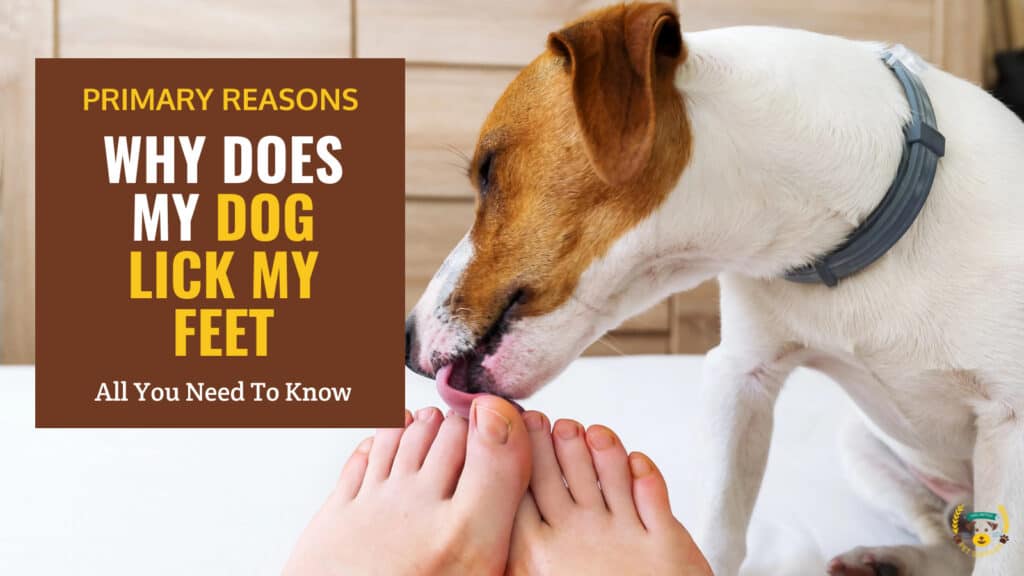Why Does My Dog Lick My Feet?
Last updated: March 26, 2024

Summary
- Dogs lick feet to show affection, seek attention, and groom their owners as part of their instinctive behavior.
- Foot licking may be triggered by the taste and scent of feet or serve as a coping mechanism for anxiety or stress.
- Excessive or obsessive foot licking can indicate medical or psychological issues and may lead to oral health or digestive problems.
- Training techniques and consulting with a veterinarian or professional trainer can help address problematic foot licking.
Have you ever found yourself lounging on the couch, enjoying a moment of relaxation, when suddenly you feel a wet, ticklish sensation on your feet? You look down to see your beloved canine companion enthusiastically licking your toes. This behavior might leave you puzzled, amused or even slightly grossed out. But why do dogs engage in this mysterious act of foot licking?
For many dog owners, this peculiar behavior is a common occurrence. Some seem to have an insatiable desire to lick their humans' feet; others only indulge occasionally. Regardless of frequency, this act often leaves owners wondering about the underlying reasons for their dogs' fascination with their feet.
In this article, we'll explore the world of canine behavior and uncover the various reasons dogs lick their owners' feet.
- 1) Reasons Why Dogs Lick Feet
- 2) When Foot Licking Becomes a Problem
-
3)
Frequently Asked Questions
- 3.1) Is it normal for dogs to lick feet?
- 3.2) Can I train my dog to stop licking my feet?
- 3.3) Should I be concerned if my dog licks my feet excessively?
- 3.4) Can foot licking be a sign of a medical issue in dogs?
- 3.5) How can I redirect my dog's licking behavior to a more appropriate outlet?
- 3.6) Are certain dog breeds more prone to foot licking?
- 3.7) Can changes in my dog's environment or routine trigger increased foot licking?
- 4) Final Thoughts
Reasons Why Dogs Lick Feet
Dogs lick feet for various reasons, ranging from instinctive behaviors to seeking attention and affection. Understanding these motivations can help you better interpret your dog's actions and respond appropriately. Let's explore some of the primary reasons behind this curious canine behavior.

Showing Affection and Bonding
Dogs are highly social creatures that thrive on forming strong bonds with their human companions. Licking is a natural behavior that dogs use to express affection and strengthen their social connections. When your dog licks feet, it may be their way of showing love and seeking closeness with you.
In addition, licking is often a sign of respect and submission. By licking your feet, your dog may be acknowledging you as the leader of the pack and demonstrating their loyalty and affection. This behavior is particularly common in puppies and young dogs, who learn to lick their mother's mouth as a way of seeking food and attention.
Seeking Attention
Sometimes, dogs lick feet simply because they want your attention. If you've been busy or preoccupied, your dog may resort to licking your feet to get you to focus on them. This behavior can be especially prevalent if your dog has learned that licking your feet elicits a reaction, whether it's laughter, petting, or even gentle scolding.
If you respond positively to your dog's foot licking, such as by laughing or petting them, you may inadvertently reinforce the behavior. Dogs are quick to learn which actions earn them the attention they crave, and if foot licking consistently results in a positive reaction from you, they may be more likely to repeat the behavior in the future.
Instinctive Grooming Behavior
Licking is a deeply ingrained behavior in dogs, serving multiple purposes in their social interactions and personal hygiene. Mother dogs lick their puppies to keep them clean, stimulate bodily functions and provide comfort.
Adult dogs also lick themselves and each other as a way of grooming and maintaining social bonds within the pack.
Dogs that live with humans often extend their instinctive licking behavior to their human family members. By licking your feet, your dog may be attempting to groom you, just as they would with their canine pack mates.
This behavior can be a sign of your dog's acceptance of you as a member of their social group.
Taste and Scent

One of the reasons dogs may be inclined to lick your feet is the presence of salt and other compounds on your skin. As you go about your day, your feet naturally accumulate sweat, which contains salt and other minerals that can be appealing to your furry friend.
In addition to salt, your feet may also harbor other compounds that pique your dog's interest. The bacteria that reside on your skin can produce odors that, while not always noticeable to humans, can be irresistible to your canine companion.
A dog's nutritional needs can also influence their licking behavior. To learn more about choosing the right diet for your canine companion and ensure your dog is getting the nutrients they need, consult your veterinarian or a qualified animal nutritionist.
Dogs' Powerful Sense of Smell and Its Role in Licking Behavior
Dogs possess an incredibly powerful sense of smell, which is estimated to be 10,000 to 100,000 times more acute than that of humans. This extraordinary olfactory ability allows them to detect and distinguish between a wide range of scents, including those emanating from your feet.
Have you ever wondered which dog breeds are particularly known for their impressive sniffing skills? Check out our article on dog breeds with the best sense of smell.
Additionally, dogs have a special organ called the vomeronasal organ, or Jacobson's organ, which is located in the roof of their mouth. This organ allows them to detect and analyze pheromones and other chemical signals that provide them with a wealth of information about their environment and the individuals around them.
By licking your feet, your dog may be picking up on subtle changes in your scent that can indicate your emotional state, hormonal changes or even your overall health. This information can help your dog better understand and connect with you, strengthening the bond between you and your furry companion.
Anxiety or Stress Relief
In some cases, foot licking may serve as a coping mechanism for dogs experiencing anxiety or stress.

Licking as a Self-Soothing Mechanism
When dogs feel stressed or anxious, they may engage in repetitive behaviors like licking to help themselves feel more relaxed and secure. The act of licking releases endorphins, which are natural feel-good hormones that can help reduce stress and promote a sense of well-being.
If your dog tends to lick your feet more frequently during times of stress or change, such as when there are loud noises, unfamiliar visitors or changes in their routine, it may be a sign that they are seeking comfort and reassurance through this behavior.
Identifying and Addressing Potential Stressors
If you suspect that your dog's foot licking is related to anxiety or stress, it's important to identify and address the potential stressors in their environment. Some common sources of stress for dogs include the following:
- Loud noises, such as thunderstorms or fireworks
- Changes in routine or environment, such as moving to a new home or the addition of a new family member
- Lack of mental stimulation or exercise
- Separation anxiety when left alone for extended periods
By recognizing and minimizing these stressors, you can help your dog feel more secure and reduce their reliance on foot licking as a coping mechanism. Providing your dog with a consistent routine, plenty of exercise and mental stimulation, and a safe, comfortable environment can go a long way in alleviating anxiety and promoting overall well-being.
If your dog's anxiety or stress seems severe or persistent, it's always a good idea to consult with your veterinarian or a professional dog trainer for guidance on addressing the underlying issues and developing a customized plan to support your furry friend's emotional health.
When Foot Licking Becomes a Problem
While occasional foot licking is a normal part of canine behavior, excessive or obsessive licking can indicate underlying issues that require attention. It's important to recognize when your dog's licking habits cross the line from endearing to problematic, as this can impact their health and well-being.

Excessive or Obsessive Licking
When foot licking becomes uncontrollable, this may be the sign that your dog needs professional help.
Identifying Compulsive Behavior
Compulsive licking goes beyond the occasional show of affection or grooming. If your dog seems fixated on licking your feet, spending an inordinate amount of time engaged in this behavior, it may be a sign of a compulsive disorder. Other indications of compulsive licking include:
- Licking to the point of causing skin irritation or damage
- Difficulty stopping the licking behavior, even when discouraged
- Licking interfering with normal activities, such as eating or sleeping
Potential Underlying Medical or Psychological Issues
Excessive foot licking can be a symptom of various medical or psychological problems. Some potential causes include:
- Allergies or skin irritations
- Hormonal imbalances, such as hypothyroidism
- Gastrointestinal issues, like inflammatory bowel disease
- Arthritis or other sources of chronic pain
- Anxiety, stress or boredom
Consider rewarding your furry friend with healthy and delicious all-natural meat treats for dogs. These treats are a great way to show your dog you care while providing them with a tasty and satisfying snack.
If you suspect your dog's foot licking is excessive or compulsive, consult with your veterinarian to rule out any underlying health concerns and develop an appropriate treatment plan.
Hygiene Concerns
Human feet harbor various types of bacteria and other microorganisms, which can be transferred to your dog's mouth during licking. While a healthy dog's immune system can typically handle these bacteria, excessive exposure can lead to oral health issues or digestive problems.

In some cases, the bacteria present on human feet can cause infections or skin irritation for dogs, particularly if they have cuts or abrasions in their mouth or on their tongue. Similarly, if you have any open wounds or cuts on your feet, your dog's saliva can introduce bacteria and increase the risk of infection.
Addressing Problematic Foot Licking
If your dog's foot licking has become excessive or bothersome, you can employ training techniques to discourage the behavior. Some effective strategies include:
- Redirecting your dog's attention with toys or treats when they start licking
- Using positive reinforcement to reward your dog for not licking
- Consistently saying "no" or "stop" when your dog begins to lick, and praising them when they comply
Be patient and consistent with your training efforts, it may take time for your dog to learn and adapt to new behaviors.
Consulting with a Veterinarian or Professional Dog Trainer
If your attempts to curb excessive foot licking are unsuccessful, or if you suspect an underlying medical or behavioral issue, consult with your veterinarian or a professional dog trainer. They can provide expert guidance and develop a customized plan to address your dog's specific needs.
Frequently Asked Questions
As a dog owner, you may still have many questions about your furry friend's foot-licking behavior. This section of the article addresses some of the most common concerns to guide you in understanding and managing this intriguing canine behavior.
Is it normal for dogs to lick feet?
Yes, it's perfectly normal for dogs to lick their owners' feet. This behavior is a natural part of their communication and bonding process. Dogs use licking to show affection, seek attention and gather information about their environment.
Can I train my dog to stop licking my feet?
While excessive foot licking can be discouraged through training, it's an instinctive behavior for dogs. Focus on redirecting your dog's attention to appropriate outlets, such as toys or games.
Should I be concerned if my dog licks my feet excessively?
Foot licking may indicate an underlying issue. Consult your veterinarian if your dog's licking causes skin irritation or interferes with daily activities.
Can foot licking be a sign of a medical issue in dogs?
Yes, excessive foot licking can be a symptom of various medical problems such as allergies, infections, joint pain, or gastrointestinal issues. Consult your veterinarian for proper diagnosis and treatment.
How can I redirect my dog's licking behavior to a more appropriate outlet?
To redirect your dog's licking behavior to more appropriate outlets, provide alternative activities that engage their senses and satisfy their instincts, such as interactive toys, chew toys, regular exercise, and training sessions.
Are certain dog breeds more prone to foot licking?
While some breeds - especially those originally bred for hunting or retrieving, such as Golden Retrievers or Labradors - may be more inclined to foot licking due to their genetic predisposition or personality traits, all dog breeds exhibit the habit to different degrees.
Still, individual dogs, even within a specific breed, can vary greatly in the frequency of their behavior.
Can changes in my dog's environment or routine trigger increased foot licking?
Yes, changes in environment or routine can trigger stress-related behaviors like increased foot licking. Provide your dog with comfort, reassurance and stability during times of change to keep the habit from worsening.
Final Thoughts
Dogs licking feet is a common behavior that often puzzles and amuses owners. Throughout this article, we've explored the various reasons behind this curious canine habit, from showing affection and seeking attention to instinctive grooming and sensory exploration.
While foot licking is generally a normal part of dog behavior, it's crucial to recognize when it becomes excessive or problematic. Compulsive licking can indicate underlying medical or psychological issues that require professional attention. Regular check-ups with your veterinarian can help identify and address any concerns before they escalate.
Remember, your dog's foot licking is just one of the many ways they communicate and bond with you. By understanding and respecting their unique personality and needs, you can foster a loving, trusting relationship that enriches both your lives.
Thanks for reading!






